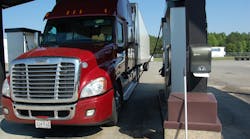A broad survey of transportation executives in the aerospace, aviation, trucking, maritime and railroad industries finds that concerns over energy availability, cost, and regulatory burdens are rapidly increasing, with their fears fueling changes in corporate strategy – especially in terms of supply chain management.
Most of the 209 responses to this study – conducted this summer by Forbes Insights on behalf of the CIT Group – came from freight and passenger carriers, along with manufacturers, freight brokers and dealers operating in the transportation space, and found that more than eight out of 10 (81%) believe uncertainty surrounding energy policies is hampering global economic recovery.
On top of that, 80% of those polled added that today’s higher fuel costs are reducing global economic growth, with more than six out of 10 (63%) believing that fuel prices will increase over the next 18 months. A further 78% expect prices to increase over the next three years and 69% think prices will increase over the next five years, CIT found, with 38% believing those price hikes will be “significant.”
“This study highlights the fact that transportation executives are preparing for a future of uncertainty, both in terms of fuel prices and regulations,” noted Jeff Knittel, president of CIT Transportation Finance. “In doing so, they are implementing strategic business plans in response to the potential for a protracted era of higher energy costs and growing concern regarding current and proposed emissions regulations.”
Those “strategic plans” also cover a wide assortment of areas, CIT added. For example, nearly half(47%) of carriers reported their customers are working more closely with third-party logistics groups to optimize transportation costs, with 35% noting that their customers are relocating production or warehousing for the same reason.
Another 81% told CIT that they are updating their fleets to be more energy efficient, with 79% adding that they are doing more to promote their sector’s energy efficiency relative to other transportation modes.
On top of that, more than three out of four (77%) manufacturers are working to develop vessels, trucks and rolling stock that are more energy efficient, with another 64% noting that they are investing in new plants expressly for this purpose. Finally, 84% said they are working more closely with transportation companies to “engineer” greater transportation efficiency, according to CIT’s findings.
Still, despite all of those efforts, 31% believe their customers will still encounter “financial duress” as a result of rising energy costs,
That “duress” is partly due to the greater impact of regulations on energy, especially when it comes to rules designed to control and reduce emissions, those polled by CIT reported.
For starters, 76% of transportation executives said they are “concerned” by current and proposed emissions regulations, with 47% of them adding that the state of emissions regulation is contributing to higher energy costs – a figure that rises to 64% among trucking companies. Overall, 86% say such emissions regulations are adding to operating costs, with 79% adding that regulatory actions are forcing their companies to increase spending on capital equipment.
TL carrier Werner Enterprises touched on the monetary impact upon trucking operators trying to comply with such emission rules within its second quarter earnings report issued back in July.
“It is very difficult for many smaller and medium size private carriers to replace their older, lower-value trucks with much higher cost, EPA [Environmental Protection Agency]-compliant new trucks, which significantly reduces the risk of trucks being added to the market,” Werner explained.
“We reduced the average age of our much younger truck fleet by half a year during 2011 and 2012, with net capital expenditures totaling $457 million during that two-year period,” the carrier pointed out. “The significantly higher cost of new trucks and resulting higher depreciation expense and related diesel exhaust fluid costs is not being recovered through a single year customer rate review cycle.”
Indeed, 66% of respondents to CIT’s survey said government policies have driven energy prices higher, with efforts to combat perceived long-term climate change running counter to a near-term economic growth agenda.



